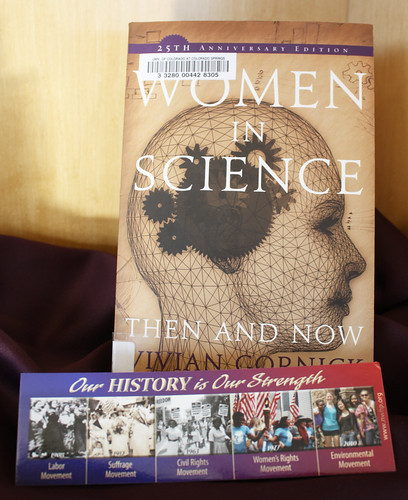Women in Science by Kraemer Family Library, on Flickr (http://www.flickr.com/photos/27640054@N08/5526926256/)
After the presentations in the morning (and some very gooey brownies at lunch), we reconvened for a discussion session, followed by a plenary session reporting on the results of the discussion. Below are the random notes I made during the discussions and the plenary.
- On the differences in perceptions between men and women: in chemistry, for women a PhD was viewed as an ordeal, while for men it was a rite of passage.
- We should value talent - Beckham doesn't leave football when he's injured, why should a woman leave science when she has a baby?
- We need to collect information about where people who leave science actually go to. This point was then expanded to a general one about needing to get some social scientists to look into this whole situation more.
- The point was made that attitudes can be changed by legislation (for example the social unacceptability of smoking as a result of the smoking ban) , though the counter example was that people tend to pay selective attention to legislation (for example, the mobile phone ban while driving).
- Legal quota systems often aren't fair - for example, when there's a legal requirement to have a 50-50 sex ratio for exam invigilation, and only 20% of the lecturers are one sex, the burden of invigilation falls unfairly hard on them.
- Money does talk - if university departments required an award (such as Athena Swan Silver) before they could get a grant, things would change pretty quickly!
- Headhunters are often key to pull women up through into boards, and should therefore be worked with. There was a proposal that universities should require headhunters to return equal numbers of male and female candidates for a post. Networks and professional bodies are also useful for women to be part of, as headhunters often go to them to find candidates.
- The example of the Chemistry department at the University of York was referenced repeatedly (as you'd expect for them being a trailblazer). They had to move from large quantities of effort to a smaller, higher quality of effort, and the head of department was key to making this work as a guardian of culture.
- Regarding self confidence issues, it was acknowledged that actually both sexes need help with self confidence. Women admit their lack of self confidence, while men bluster, but both situations are problematic.
- Everyone acknowledged that it was harder for men to say things like "can we start the meeting later? I need to take my kids to school." This shouldn't be the case! One participant said that in her department, the standing rule was no meetings outside of school hours, and that this worked well for everyone.
- We need to harness enlightened self-interest to change things.
- We also shouldn't shrink the problem - we can't extrapolate out from the local situation to encompass all of science. Yet it's at the local level where the most drive to fix things can be found, and local implementation is important to cover the multiplicity of issues, because there's no one problem across all the sciences.
- One delegate raised the question: is the lack of women in academia actually a problem? And if it is, is it not a problem that will be self-correcting once the universities realise? (To me, this sounded like "the market will sort it out" sort of thinking I've come across in my radio days. Unfortunately, when it comes to things like that, the market isn't that helpful.)
- Bottom up and top down initiatives need to meet, probably at the level of the Principal Investigator, as they're the ones who train the next generation of scientists and pass on the culture.
- Yes, we need more facts and information, but we can't afford to sit on our hands waiting for them - we need to take action as well.
My discussion group came up with the following points (which I managed to scribble down):
- Profile problem: people need to be made aware of the leaky pipeline problem.
- Acceptance: many people don't even believe the leaky pipe is a problem. Leaders and guardians of culture need to be targeted and trained about unconscious bias.
- Positive campaign: pooling best practise and publicising the benefits to all
- Role models: (surprisingly to me) the evidence for their usefulness is very weak, and there are both positive and negative results in having role models.
We made the following proposal - that there should be social science research commissioned (by the research councils?) to answer our questions, like how to quantify the value to the economy of fixing the leaky pipe, and then to make publicly available these results and the facts collected as part of the research.
So, in other words, we did what scientists everywhere do - decided that we needed further research! Still, it was a very interesting discussion, and I'm hoping that people went away from the conference that bit more determined to change their departmental culture for the better!

No comments:
Post a Comment